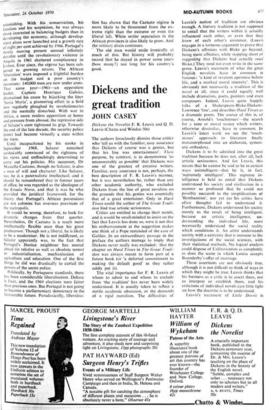Lusitania
BRIAN CROZIER
Salazar and Modern Portugal. Hugh Kay (Eyre and Spottiswoode 85s) It is not, I maintain, a frivolous concern for topicality that makes me start this review of a book on the late Prime Minister of Portugal with a reference to the late Presi- dent of the United Arab Rebublic. For Nas- ser owed much to Salazar. In the 1950s, when he was searching for an ideology and a polity suitable for revolutionary Egypt, he turned to Salazar's Estado Novo. His first attempt at no-party instrument of government was indeed called the 'National Union' and was borrowed from Salazar's Una, Nacional. (In keeping with the times, it has since be• come the Arab Socialist Union.) By a quirk of semantic alchemy, Nasser's system has attracted the adulation of 'progressive' opinion in the West, while Salazar's, on which it was based, remains an object of hate and abhorrence. But then. Nasser and his poverty-stricken people were revolutionary, emergent and socialist; while Salaz.ar and his poverty-stricken people were reactionary, colonialist and rooted in the past. The paradox remains. Hugh Kay does not mention Nasser's debt to Salazar, but that is a small reproach. He has written the best book on modern Portugal that has come my way. It is cool and fair. It is clear that Mr Kay loves Portugal and admires the man who ended the long reign of chaos and irresponsibility that had beset it, restoring order, dignity and sound finances. But his love is occasionally hurt and his admiration is not uncritical.
It would be strange if it were otherwise. Salazar was an austere, didactic intellectual. who loved his country and attributed its worst evils to liberalism and parliamentary democracy. These he could cure, and did. The residual ones—such as poverty and in equality—he tended to consider the will of God. It is probably wrong to say that he lived in the past. For him, the past meant the years of chaos; the present began either in 1928, when he was reappointed Finance Minister on his own terms, or in 1932 when he became Prime Minister with the Army approval; and he was determined to keep the present as it was, with no future to spoil it. His success in freezing Porttigal's time wa5 •
astonishing. With his conservatism, his fatalism and his scepticism, he was always more interested in balancing budgets than in developing
the economy, although develop- ment plans were launched and a growth rate of eight per cent achieved by 1966. Portugal's slowly moving present seemed infinitely durable until the revolutionary violence in Angola in 1961 shattered complacency in Lisbon. Ever since, the regime has been sub- jected to growing strains. The African 'liberation' wars imposed a frightful burden on the budget and a poor country's resources: 140,000 men are now under arms. That same year-1961—an opposition leader, Captain Henrique Galvi o. dramatised his cause by hijacking the liner 'Santa Maria', a pioneering effort in a field now regularly ploughed by revolutionaries and the mentally disturbed. With war in Africa, a more restless opposition at home and pressure from abroad, the repressive side of Salazar's state tightened its grip. Towards the end of the late decade, the security police (pioE) had become virtually a state within the state.
Until incapacitated by his stroke in September 1968, Salazar remained unshakably convinced of the rightness of his views and unflinchingly determined to carry out his policies. His successor, Dr Marcello Caetano, though no Salazar, is also a man of will and character. Like Salazar, too, he is a paternalistic intellectual: and it should be remembered that in former years of office, he was regarded as the ideologue of the Estado Novo, and that it was he who provided the juridical framework for the theory that Portugal's African possessions are not colonies but overseas provinces of the metropolis.
It would be wrong, therefore, to look for dramatic changes from that quarter. Nevertheless, Dr Caetano is a much more intellectually flexible man than his great predecessor. Though not a liberal, he is likely to be a moderniser. He is not indifferent, as Salazar apparently was, to the fact that Portugal's Iberian neighbour has soared ahead (in relative as well as absolute terms) in industrialisation, mechanisation of agriculture and education. One of the first things he did was drastically to curtail the powers of the secret police.
Politically, by Portuguese standards, there has been considerable liberalisation. Debate is freer, and the 1969 elections were fairer than previous ones. But Portugal is not going to become a parliamentary democracy in the foreseeable future. Paradoxically, liberalisa-
tion has shown that the Caetano regime is more likely to be threatened from the ex- treme right than the extreme or even the liberal left. White settler separatism in the African provinces is also likely to grow. And the military drain continues.
The old man would smile ironically at much of this. But history will probably record that he stayed in power some years (how many?) too long for his country's good.















































 Previous page
Previous page